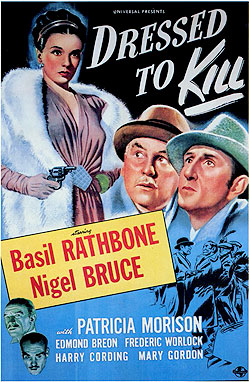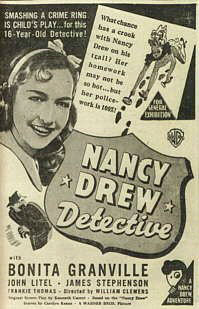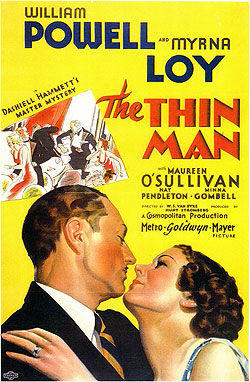
Triple Feature Feature
I'm something of a sucker for mysteries, particularly the whodunits with the ingenious detective seeing connections mere mortals miss. Still, except for the Robert Downey, Jr. film from last year and bits here and there of the Jeremy Brett dramas, I haven't had a lot of experience with the granddaddy of the super sleuth, Sherlock Holmes.
This summer, however, I got to spend three glorious evenings with the man himself, as reimagined by Steven Moffat and Mark Gatiss. Set in modern-day London, "Sherlock" features a strange, mad, and brilliant Sherlock and a courageous, cautious, and careful John, and it's brilliant. Absolutely brilliant.
So, this month, I looked at some of the most famous literary detectives ever to grace the screen: Sherlock Holmes, Nancy Drew, and Nick Charles.
Dressed to Kill (1946)
(Directed by Roy William Neill. Starring Basil Rathbone, Nigel Bruce, and Patricia Morison.)
 When you think of Sherlock Holmes, you think of a Victorian gentleman wearing a deerstalker hat and smoking a pipe. In the 1940s, however, the cinematic Holmes was a dapper modern gentleman, battling evil in whatever guise it took, whether it was gun-toting thugs or a Nazi propagandist traitor.
When you think of Sherlock Holmes, you think of a Victorian gentleman wearing a deerstalker hat and smoking a pipe. In the 1940s, however, the cinematic Holmes was a dapper modern gentleman, battling evil in whatever guise it took, whether it was gun-toting thugs or a Nazi propagandist traitor.
In Dressed to Kill, an old friend of Dr. Watson's (Nigel Bruce) is an avid music box collector, with dozens of varied and complex trinkets, many of which are rare and expensive. When his latest purchase — one of three identical inexpensive music boxes recently sold at an auction — is stolen, Holmes (Basil Rathbone) is intrigued enough to investigate. Holmes may be a genius, but can he figure out the hidden message before the murderers do?
Regardless of how much he grew to dislike it and typecasting it brought, Rathbone makes a great Sherlock Holmes. He has a look of intelligence that works so well here. Bruce's Watson, however, leaves something to be desired. Personally, his bumbling, absent-minded professor sort of style wears a bit thin.
I've always had the impression that Sherlock Holmes is kind of an uber-logic, like logic and reasoning are the only important things, and that social pleasantries get in the way. However, Rathbone's Holmes is rather a gregarious fellow. He seems quite normal, actually. He's a genius, yes, and he seems rather posh (whether that's Holmes himself or the era and style of film-making, I can't be sure), but he doesn't seem all that difficult to deal with. This makes Watson kind of superfluous, since I've always imagined him as the sort of translator between Holmes and the rest of the world. Since this Holmes doesn't need that, Watson becomes this bumbling sidekick who gets in the way more often than not.
As best as I can find on the internet, this story isn't based, loosely or otherwise, on any of Sir Arthur Conan Doyle's Sherlock Holmes' adventures, so there's no risk of spoiling any of the books. As a mystery, Dressed to Kill is pretty good. The mystery revolves mostly around the meaning of the clues rather than the whodunit behind it, but it's effective nonetheless. I'll be honest with you, though: I didn't understand the significance of the final clue, but that might just be my own ignorance. It didn't make the moment any less effective; I just had that moment, after the movie was over, of, "Wait, what? I don't get it."
This certainly hasn't been my favorite movie ever, but I like Rathbone's Holmes enough to want to see more of his performances. Which is probably the best thing you can say about any actor, really.
Nancy Drew -- Detective (1938)
(Directed by William Clemens. Starring Bonita Granville, John Litel, Frankie Thomas, and Frank Orth.)
 If you knew me in real life, you'd think I'd be prime candidate for the Nancy Drew books. I enjoy mysteries and young adult fiction. I love many things from the '30s and '40s. My name is even Nancy. But, I was too busy reading The Babysitters Club to be all that interested in the adventures of Miss Drew. However, you put Nancy Drew in a movie from 1938, and I'm there.
If you knew me in real life, you'd think I'd be prime candidate for the Nancy Drew books. I enjoy mysteries and young adult fiction. I love many things from the '30s and '40s. My name is even Nancy. But, I was too busy reading The Babysitters Club to be all that interested in the adventures of Miss Drew. However, you put Nancy Drew in a movie from 1938, and I'm there.
Based loosely on the book The Password to Larkspur Lane, Nancy Drew -- Detective opens with Mrs. Eldredge, a kindly and eccentric old widow, offering to donate money to the school Nancy (Bonita Granville) attends. Sadly, Mrs. Eldredge leaves notice that she's left town and won't be donating anything after all. Nancy finds this suspicious, particularly after Dr. Spires is kidnapped, forced to treat an old woman for an injured shoulder, and beat up after telling Nancy's dad, lawyer Carson Drew (John Littel) about it. Ignoring the teasing from Captain Tweedy (Frank Orth), Nancy enlists the help of her reluctant friend Ted Nickerson (Frankie Thomas) to try and track down the evil-doers.
This version of Nancy Drew is the quintessential plucky teen. In fact, if I watch this in certain moods, I find her a little annoying, in a, "Really? Do you always have to be right?" sort of way. Even so, there's a lot to like about her. For one thing, early on in the movie, she gets a flat tire, which, by all appearances, she changes herself. That's actually not something you see very often in the media, regardless of the era. Plus, she's clever, tenacious, and sharp, all of which make her very resourceful.
Ted, on the other hand, is as put-upon a character as I've ever seen. All he wants to do is be, well, normal, and before he's had a chance to refuse Nancy's latest scheme, he's halfway to helping her anyway. It's certainly not the most even-handed relationship ever, but at least he's there, pitching in, because however annoying he finds her, Ted can't say no to Nancy when she's in trouble. It's rather endearing. Plus, it's nice to have someone who is normal in the proceedings.
I know in the books, Nancy is 19, out of school and can do pretty much anything she likes without being hampered by her age. I don't mind that she's younger here — it's fitting for Granville, and it gives the series potential, should it want to last for years — but the age change does make Carson Drew look like a... well, not a bad father, exactly, or even a distant one, but certainly not a good one. In this movie, people who know anything about this kidnapping business are literally beaten up, and Carson Drew, knowing full well how precocious his daughter is, sees nothing wrong with letting her travel without him. Not that his presence would have really stopped her, but he seems more than a bit lax about these things, and I think, were Nancy older, it wouldn't seem so neglectful.
If you want to see some vintage teenage sleuthing, full of old-timey cars and clothes and slang, I'll bet you $23.80 you won't find much better than Bonita Granville's turn as Nancy Drew.
The Thin Man (1934)
(Directed by W. S. Van Dyke. Starring William Powell, Myrna Loy, Maureen O'Sullivan, and Nat Pendleton.)
 There's no use beating around the bush: I love this movie. No, really, I love this movie. Even though it's a murder-mystery, it's one of those pick-me-up movies that I adore.* It's proof that actors can totally and completely make or break a film. Right, let's get down to business.
There's no use beating around the bush: I love this movie. No, really, I love this movie. Even though it's a murder-mystery, it's one of those pick-me-up movies that I adore.* It's proof that actors can totally and completely make or break a film. Right, let's get down to business.
*No lie, in my notes, the very first thing I wrote down, during the opening credits, was — and I quote — "OMG I LOVE THIS MOVIE!"
The Thin Man is about Clyde Wynant, a cranky, eccentric inventor who is leaving town for several weeks to work on a new invention. He promises to return for his daughter Dorothy's (Maureen O'Sullivan) wedding. Only, he doesn't return, and Dorothy is worried. One evening, she happens upon Nick Charles (William Powell), a former detective who once worked for her father, and asks for help. Nick, however, has been out of the detecting business ever since he married Nora (Myrna Loy). Unfortunately, Nick can't seem to stay out of the case, which gets more complicated when Wynant's secretary and mistress Julia Wolfe is found dead. The hunt is on for Wynant, but can Nick find him before something even more terrible happens?
Let me make this perfectly clear: this movie would be so very much less than it is without William Powell and Myrna Loy. I love William Powell, and I love Myrna Loy, and I love them even more when they're together. Though they'd already appeared together onscreen (Manhattan Melodrama, also from 1934), this is the movie that really cemented their onscreen relationship in the minds of the movie-going public. (All told, they were in 14 films together, which is nothing to sneeze at.) They're funny and affectionate, but not sappy; they tease each other but are never mean about it; and they can banter like no one's business. They well may be the perfect screen couple.
Besides giving us the perfection that is Powell and Loy, this movie also gives us a really strong mystery. Right from the get-go, nearly everyone who is introduced is suspicious, and the movie very quickly casts doubts on pretty much anyone we see. About the only ones who aren't suspicious are Nick, Nora, Lieutenant Guild (Nat Pendleton), and Asta (that's the Charles's dog). And, once all the suspects (or suspects, as Mr. and Mrs. Charles say) are gathered for the final confrontation, it's anyone's ball game.
Even though I've seen this film more times that I can remember, there's always something to enjoy. This time, it was the cinematography... in addition to the sparkly dialogue. I'm actually not one to get too wrapped up in the visuals of a movie on a deep, philosophical level; I'm usually too involved in the story and characters to think critically about any visual style. However, I really appreciated the look of this film. It's a pretty dazzling example of black-and-white cinematography. When we first meet Nick and Nora, the nightclub fairly sparkles. With the menacing thin man of the title on the loose, there's plenty of interesting play with shadows. Nick's and Asta's late-night visit to Wynant's shop is a particularly effective scene made all the more tense and atmospheric by the shadows and silhouettes.
Given how good this movie is on every level, it's almost shocking to learn that it was filmed in just 12 working days. Can you imagine? That's faster than most television dramas, and those are some of the quickest things filmed in the business. I can barely manage one of these articles in 12 days; a whole movie that's almost nearly perfect? It's the stuff dreams are made of.
If you've got a free evening, run, don't walk, and get your hands on a copy of this movie and watch it. It's got everything you might want in a film, all wrapped in a neat, 91-minute package.